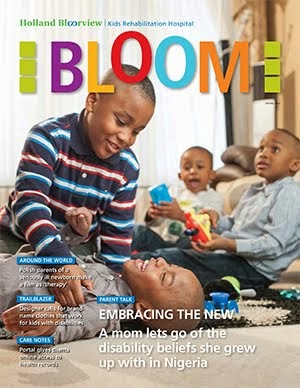By Megan Jones
Denise Clayton and her family are too familiar with hospitals: in fact, they’ve spent nine of the past 11 Christmases in one.
Denise’s middle daughter Stephanie (photo right) was born with omphalocele, a condition that causes abdominal organs to grow outside the body. Although a string of operations has long since put everything back in place, the 11-year-old has spent most of her life hospitalized.
Today Stephanie lives with intestinal failure and experiences debilitating chronic pain, which often becomes so intense that it causes her to yell and scream uncontrollably. The pain comes quickly, and with little warning: one minute Stephanie might be running and playing. The next, she’s doubled over.
The uncertainty caused by the slew of surgeries, constant hospital stays and sudden, crushing pain has been undeniably stressful for Stephanie. But, Denise points out, it has also taken its toll on a less-discussed set of family members: her other two daughters.
Sydney, 13 (centre), and Danielle, 9 (left), have learned from an early age how to care for their sister—and for themselves. Denise’s husband, Greg, often travels outside of the province for work. So when their mother has to unexpectedly rush Stephanie to the hospital, her other two children are left to take care of themselves.
“They never know when they come home if there’s going to be somebody there,” Denise says. “They don’t know who’s going to get them dinner; they don’t know who’s going to help them with their homework.”
For years, Denise’s family coped without outside support for Sydney and Danielle. Although Denise looked for sibling support, nearly all the respite and therapy services she found were designed for parents, or for the children living with an illness or disability themselves.
Then, finally, after almost a decade of searching, Denise found the Young Carers Program.
Young Carers, which launched in early 2011, offers support to children under 18 who care for family members with a disability, addiction or chronic illness. While Young Carers offers programs specifically for siblings through a program called “Sibs,” not all clients are responsible for aiding their brothers and sisters. Some help sick parents or grandparents instead.
The service is run and funded by Hospice Toronto, and offers weekly programs, drop-in services, seasonal day camps, and monthly group excursions to places like theme parks and movie theatres. It also acts as a liaison between families and schools, stepping in when children can’t attend classes or complete assignments, and helping schools adapt to fit families’ needs.
According to Larisa MacSween, the program’s manager, too often young carers’ needs are eclipsed by those of their sibling or relative with special needs. While carers may be stressed and anxious, many feel too guilty or embarrassed to ask for support when a brother, sister or parent requires extra care. Young carers also seldom get the chance to “just be kids,” as their responsibilities and parents’ commitments leave little or no time for extracurricular activities or play dates with friends.
But at Young Carers, programming blends fun activities with discussion: the idea is to allow kids a safe space and time to relax, while working in serious talks about how to better cope with stress, or how to balance their own emotional needs with those of their family members.
Larisa says one of the most important things the program does is show kids that they’re not alone. “When children find they’re connected to someone else who’s been through the same experience, that completely boosts their self-image and their self-esteem,” she says.
“Having an outlet to think about their own needs, and learning to express them, that also really gives them a big boost.”
This has certainly been the case for Denise’s daughters. She says the program has given them a sense of community and belonging. “[Young Carers] is making my kids feel like they are being heard, they are understood, they are not alone and they have a place to go,” she says.
Currently, the program supports about 100 registered children. But the idea of a young carer is still relatively new in North America. Larisa says that the importance of supporting young carers has only started to be afforded attention in the last year or so in Canada. As a result, few comparable programs exist. And with an estimated 108,000 young carers Canada-wide, many kids still go without help.
Denise believes this needs to change. She says the support Young Carers offers has helped her daughters tremendously.
“With Sydney I notice that when she goes to Young Carers, she comes home and she’s not as anxious as she typically is,” Denise says.
“They both seem to be more tolerant. Tolerant to their sister’s screaming, or not being able to do something that day, like go out and ride their bikes. After attending the program they’re more understanding.”
Recognizing that not all parents will have access to support programs, Larisa says that parents can do small things to help siblings at home. She stresses that communication is key, and suggests parents keep children up to date about the health of their brother or sister, in order to ease anxiety. She also says parents should encourage kids to speak about their feelings, and share their stresses and fears.
Most importantly, Larisa says, young carers should be commended for their work, and validated for the help they provide their families.
“When children hear ‘Hey, you’re really doing a great job,’ that alone can show them how much they are valued,” she says.

























0 comments:
Post a Comment